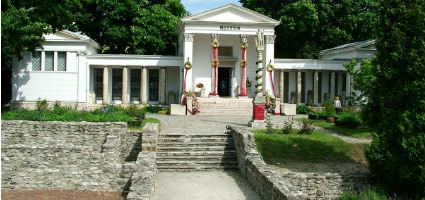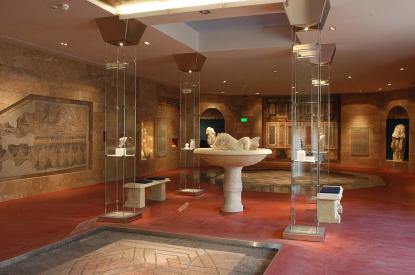2024. November 24. Sunday
Budapest History Museum - Aquincum Museum - Budapest
 |
Address: 1031, Budapest Szentendrei út 135-139.
Phone number: (1) 250-1650, (1) 430-1081
E-mail: aquincum@aquincum.hu
Opening hours: 01.04-31.10.: Tue-Sun 10-18
Park: 9-18 01.11-31.03.: Tue-Sun 10-16< |
Museum tickets, service costs:
|
Ticket for adults
(summer term)
|
1600 HUF
|
/ capita
|
|
Ticket for adults
(in winter)
|
1000 HUF
|
/ capita
|
|
Individual ticket for adults
|
1000 HUF
|
/ /capita
|
|
Group ticket for adults
(in winter)
|
1000 HUF
|
/ capita
|
|
Ticket for students
(summer term)
|
800 HUF
|
/ capita
|
|
Ticket for students
(in winter)
|
500 HUF
|
/ capita
|
|
Individual ticket for students
|
500 HUF
|
|
|
Ticket for pensioners
(summer term)
|
800 HUF
|
/ capita
|
|
Ticket for pensioners
(in winter)
|
500 HUF
|
/ capita
|
|
Individual ticket for pensioners
|
500 HUF
|
|
|
Ticket for families
(summer term)
|
2100 HUF
|
/ family
|
|
Ticket for families
(in winter)
|
1700 HUF
|
/ family
|
|
Program ticket
|
900 HUF
|
|
|
Program ticket
|
800 HUF
|
|
|
Season ticket for a year
|
8000 HUF
|
|
|
Season ticket for a year
|
30000 HUF
|
|
|
Season ticket for a year
|
20000 HUF
|
|
|
Season ticket for a year
|
160000 HUF
|
|
|
Season ticket for a year
|
160000 HUF
|
|
|
Individual season ticket for a year
|
5000 HUF
|
|
|
Group guide
(min. 20 capita)
|
1000 HUF
|
/ / capita
|
|
Group guide
(over 25 people)
|
8000 HUF
|
/ group
|
|
Group guide for adults
|
4000 HUF
|
/ group
|
|
Group guide for students
(in summer)
|
600 HUF
|
/ / capita
|
|
Group guide for students
(min. 10 capita)
|
450 HUF
|
/ / capita
|
|
Group guide for adults
|
6000 HUF
|
|
|
Photography
|
600 HUF
|
/ piece
|
|
Video
|
600 HUF
|
/ piece
|
The newest permanent exhibition of at the Aquincum museum is now open to the public in the recently re-built and restored 'electrical transformer house', a protected monument building in its own right, constructed in Neo-Classical style and situated at the edge of the archeological park.

The exhibition presents valuable but never before exhibited finds from the rich collections of the museum. The exhibition hall is now spacious enough to hold the freshly restored mosaics and wall paintings from the governor's palace excavations. The visitors can also see monumental statues which formerly stood in sanctuaries, the dolphin fountain or a reconstruction of a large ornamental stone vessel (crater). These objects all reflect the luxurious nature of the palace's interior. The objects presented in the cases, including imported bronze, glass or ceramic vessels as well as the gold and silver jewelry, were all part of the daily life the governor and the coterie surrounding him.
The other unique aspect of the new exhibition is that the world famous archaeological find, the Aquincum organ, can again be exhibited some 75 years after it was first brought to light. The remnants of the organ were discovered during excavations preceding foundation work on the building that today serves as the main exhibition building of the Aquincum Museum. The preserved parts of the organ, the reconstrution of its structure and mechanism as well as a playable copy are also on exhibit here.

The exhibition presents valuable but never before exhibited finds from the rich collections of the museum. The exhibition hall is now spacious enough to hold the freshly restored mosaics and wall paintings from the governor's palace excavations. The visitors can also see monumental statues which formerly stood in sanctuaries, the dolphin fountain or a reconstruction of a large ornamental stone vessel (crater). These objects all reflect the luxurious nature of the palace's interior. The objects presented in the cases, including imported bronze, glass or ceramic vessels as well as the gold and silver jewelry, were all part of the daily life the governor and the coterie surrounding him.
The other unique aspect of the new exhibition is that the world famous archaeological find, the Aquincum organ, can again be exhibited some 75 years after it was first brought to light. The remnants of the organ were discovered during excavations preceding foundation work on the building that today serves as the main exhibition building of the Aquincum Museum. The preserved parts of the organ, the reconstrution of its structure and mechanism as well as a playable copy are also on exhibit here.
|
Related activities
|
|||
